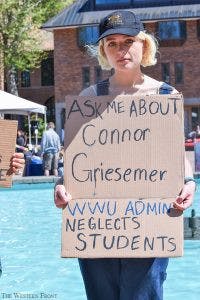Content warning: This story contains references to sexual assault. Written by: Laura Place Following news about Western’s readmission of a male student who had been convicted of sexual assault, students and faculty responded strongly with concerns for campus safety and the university’s lack of transparency surrounding the decision. The Western Front published an article discussing Western’s readmission of senior Connor Griesemer on Tuesday, May 16. Since then, students and faculty have expressed their concerns through a variety of organized responses. Resident advisers and the Associated Students both shared letters to the administration on Facebook, and protests were held in Red Square on Friday, May 19 and Saturday, May 20. Freshman Lydia Lemon said she was disheartened after reading the article, particularly by Dean of Students Ted Pratt’s comments that the interruption of Griesemer’s education by the incident was “unfortunate.” “It felt like it was apologizing to the rapist for being put in this situation where he was taken out of school. I feel like it says, ‘We’re sorry you went through this,’ even though it was an act he committed against someone knowingly,” Lemon said. Paul Cocke, director of communications and marketing, declined to comment on Griesemer’s readmission due to federal privacy restrictions. However, he said various university offices had received a number emails about the incident. “The university is acutely aware of the concerns that some students have expressed, takes these concerns seriously, and is working to address them,” Cocke said in an email. "Western wants all students to know that if they experience sexual violence, the University has resources and services to support them and processes to hold those who perpetrate sexual violence accountable." He said survivors can seek support through CASAS and the counseling center, and reporting options through the Equal Opportunity Office, the Title-IX Coordinator and University Police. A full list of of university services can be found here. Administrators’ phone numbers were shared on Facebook so students could call about their concerns.

Letters to the administration
The AS Board of Directors wrote an open letter on May 18 to Western’s administration, student body and the university at large expressing their disapproval of the decision. “The readmission of this student convicted of sexual assault is a slap in the face to advocates for survivors, survivors themselves and is a testament to the general complacency that plagues campuses across the United States,” the AS Board wrote in the letter. Sophomore Hailey Canady organized a separate letter-writing campaign, with the help of a few other RAs. The letter criticized Western for failing to uphold its promise to support survivors of sexual assault, something Pratt said is a university priority during an RA open forum in April. RAs shared the letter on Facebook, asking students to email it to administrators including Pratt, Assistant Dean of Students Michael Sledge and the Equal Opportunity Office. Cocke confirmed that the University had received emails from students concerned about the decision. Canady, a resident advisor in Fairhaven, said she was troubled by the idea that administrators, such as the dean of students, are making these decisions. “The university as its own entity can have these goals to be victim and survivor-centered, but the people that are employed here and making decisions here do not feel that way,” Canady said. Pratt responded to Canady’s email of the letter on Friday, May 19. He said student safety continues to be a top priority. “The concerns you have shared are important to me and I assure you I genuinely understand the seriousness of sexual assault,” Pratt wrote to Canady. “It is essential that we eradicate this unacceptable behavior and we are committed to that effort.” Readmission decisions are not made by any one individual, Cocke said. The Dean of Student's Office is responsible for working with University Police to first assess community safety issues in readmissions. If Western were to deny readmission to a person who would be eligible for admission to other state colleges Western would need to articulate a reason for the denial. "If a person is perceived to pose a potential threat to campus or any individual member of the university then that student will not be re-admitted to the University," Cocke said. "The safety of Western’s campus is our top priority." Protests in Red Square On Friday, May 19, around 20 students gathered in Red Square to protest the university’s decision to readmit Griesemer. The protest was organized by the Western chapter of the club, GirlUp. Students attending the protest voiced a number of concerns with the university administration’s





